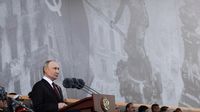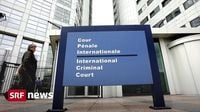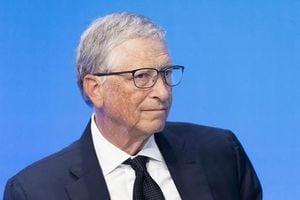On Friday, May 9, 2025, Moscow witnessed a grand display of military might as heavy military equipment rolled across Red Square, with hundreds of spectators cheering in the streets. This event, originally intended to commemorate the millions of Soviet victims in the fight against Nazi Germany, has transformed into a triumph show for President Vladimir Putin, serving as a justification for his ongoing "special operation" in Ukraine.
Among the onlookers was a five-year-old boy named Jaroslaw, who shouted "Hurra" as a T-34 tank, a symbol of Soviet valor, passed by along the Neuer Arbat. His mother, Larissa, waved a Soviet flag while his father, Daler, 48, waved at the military vehicles. Daler, who fled violence in Tadzhikistan as a child, expressed the importance of teaching his son about defenders and enemies, stating, "We help with everything we have for our soldiers because we know: We will win."
As a truck carrying an Iskander ballistic missile rumbled past, young Jaroslaw asked, "Is it an atomic bomb?" His father had lifted him onto a café railing to get a better view of the military procession. The family, alongside hundreds of other spectators, watched the military technology column on a cool Friday morning opposite the Kino 'Oktober'. A digital banner proclaimed, "The victory will be ours." Many attendees waved Putin flags, donned soldier hats, and wore the black-orange George ribbon, a symbol of military honor.
For the 80th anniversary of Victory Day, Moscow deployed extensive security measures and showcased an array of military hardware. Police patrolled every few meters, and disaster protection personnel were stationed at metal barriers throughout the city. Mobile internet services were disabled, rendering bank cards unusable, and cafés along the parade route had to close. One disgruntled woman lamented, "Not even a coffee can we get," while a man expressed frustration at not being able to hear the president's speech.
During his brief ten-minute address, Putin referred to Victory Day as a "holy day," avoiding the usual tirades against the West. Instead, he spoke of "feelings of joy and mourning, of pride and gratitude, of admiration for the generation that shattered National Socialism." He subtly intertwined references to his "special operation" in Ukraine, asserting, "Russia was and will be an indestructible bulwark against National Socialism, Russophobia, and anti-Semitism. All of Russia stands by the side of the participants in the military special operation. Truth and justice are on our side."
On the Neuer Arbat, men, women, and children cheered as rockets passed by. Irina Knjasewa, 46, proudly declared, "Our Russian soul is wide. Our country is the greatest, the kindest, the most merciful country on earth. God is with us. We will defeat everyone." She emphasized the importance of passing down memories of the past to her children, asserting, "We Russians have a memory, but the West has forgotten everything." Irina carried a wooden board adorned with pictures of her two grandfathers and her husband's grandfather, who she claimed were proud defenders of their homeland. She stated, "They wrote letters to the soldiers in Ukraine and collected money for humanitarian aid. This situation in Ukraine is for a long time. Even Trump, this showman, will not be able to end anything. But we, we Russians, will go to the end. We will finish them all."
Putin's address and the accompanying festivities have increasingly blurred the lines between remembrance and propaganda, transforming the commemoration of the millions of Soviet casualties into a celebration of military strength and national pride. As 11,500 soldiers' candidates marched across Red Square, more than 1,000 of whom were participants in the "special operation," the atmosphere was charged with a sense of patriotism and defiance.
Internationally, the parade was notable for the presence of foreign dignitaries, including Chinese President Xi Jinping, who sat directly beside Putin as the most important guest. For the first time, Russian and Iranian combat drones were showcased, highlighting the military cooperation between the two nations amid the ongoing conflict in Ukraine.
In addition to Russian forces, units from 13 countries participated in the parade, including nearly 120 soldiers from the Chinese honor guard. Xi Jinping observed as a veteran's words were translated for him, reinforcing the ties between the two nations. Meanwhile, the only EU and NATO leader present was Slovakia's Prime Minister Robert Fico, alongside Serbian President Aleksandar Vucic, emphasizing the isolation of Russia from its Western counterparts due to its aggressive actions in Ukraine.
As the parade unfolded, it was clear that the event was not just a commemoration of past sacrifices but also a bold display of military capability and nationalistic fervor. The soldiers marching in formation, the advanced weaponry on display, and the enthusiastic cheers from the crowd all served to reinforce the narrative of strength and unity that the Kremlin seeks to project.
Earlier in the day, smaller military parades had taken place across Russia's Far East and Siberia, including cities like Vladivostok, Khabarovsk, and Novosibirsk, showcasing the nationwide observance of Victory Day. With about 30 parades held across the country, the day was marked by a sense of collective memory and national pride, albeit intertwined with the current geopolitical tensions.
As the world reflects on the significance of May 9, it serves as a reminder of the complexities of history and memory in shaping national identity. In Russia, the legacy of the Second World War continues to be a potent tool for political messaging, as Putin seeks to rally support for his actions in Ukraine under the guise of historical remembrance.





